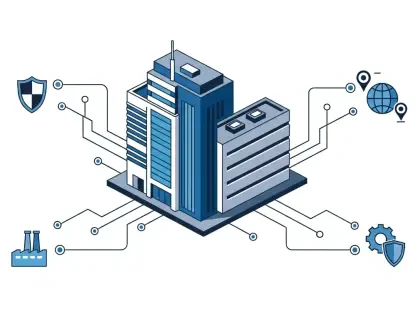The construction industry, traditionally characterized by manual processes and extensive paperwork, is undergoing a significant transformation thanks to cutting-edge technologies. Chief among these is artificial intelligence (AI), which is reshaping how companies handle insurance compliance. This shift is exemplified by the strategic partnership between CMiC, a leader in construction ERP solutions, and Constrafor, a fintech innovator specializing in procurement tools. The collaboration leverages AI to enhance efficiency, reduce labor-intensive tasks, and improve risk management practices. With the full integration of intelligent systems into construction workflows, companies are navigating regulatory landscapes with unprecedented ease and accuracy.
Enhancing Efficiency in Insurance Compliance
Automated Processes and Reduced Review Times
Historically, the review of insurance documents in construction projects consumed substantial time and resources. This traditional labor-intensive process, often fraught with inconsistencies, is now being revolutionized by AI-driven solutions. The key innovation from Constrafor, implemented within CMiC’s project management platform, has dramatically shortened the time required for document analysis. Utilizing AI, the system can scrutinize complex insurance policies in mere minutes—a task that once demanded hours. This rapid processing speed not only enhances efficiency but also ensures compliance accuracy, allowing construction professionals to focus on other strategic elements of their projects.
The AI technology employed in this partnership is designed to automatically identify and assess potential risks outlined in insurance documents. By employing sophisticated algorithms, the system flags discrepancies and omissions that might otherwise slip through manual reviews. This proactive approach to risk management significantly mitigates potential compliance issues and empowers contractors to make informed decisions. Consequently, the adoption of AI in this context is not merely about saving time but also about elevating the overall quality and reliability of compliance oversight, an essential factor in an industry where regulatory adherence is paramount.
Centralized Data Management and Workflow Integration
Beyond accelerating document review, the integration of AI technologies has brought about a centralized approach to data management within construction projects. With CMiC and Constrafor’s systems working in tandem, users experience a unified operational environment that consolidates data across various project stages. This centralized data model facilitates a coherent and streamlined workflow, allowing general contractors to manage insurance compliance in tandem with other project management tasks. Seamless integration ensures that all compliance-related information is readily accessible, enabling timely renewals, approvals, and real-time reporting without the need for disparate systems or repeated data entry.
The consolidation of project management and compliance data into a single, cohesive platform also enhances communication and collaboration among project teams. By centralizing information and workflows, the integrated system minimizes the risk of miscommunication and errors that often result from data silos. This unified approach not only furthers efficiency but also lays the groundwork for more strategic decision-making. As a result, the AI-enhanced compliance model provided by this partnership marks a significant step forward in optimizing construction project management processes.
Revolutionizing Risk Management in Construction
Leveraging AI for Proactive Risk Assessment
Risk management in construction is an intricate process that necessitates a comprehensive understanding of potential pitfalls inherent in large-scale projects. By employing advanced AI tools, the partnership between CMiC and Constrafor offers a novel way to approach risk assessment. The AI-Risk Assistant, a centerpiece of Constrafor’s platform, automatically generates detailed analyses of potential risks based on the insurance documents under review. These insights empower contractors to preemptively address exposure to risks, fostering a safer and more secure project environment.
The adoption of AI for risk management transforms insurers’ and contractors’ ability to adapt to changing circumstances swiftly. AI’s predictive analytics can forecast potential future events by identifying patterns that may go unnoticed by human analysis. This foresight allows stakeholders to implement preventive measures that mitigate risk well in advance, shortening response times and increasing resilience. Such comprehensive risk analysis ensures that construction entities remain compliant while also encouraging proactive decision-making—a critical advantage in a sector driven by deadlines and intricate logistics.
Impact on Strategic Initiative and Growth
The efficiencies gained from integrating AI into insurance compliance are not limited to operational improvements. The newfound agility and accuracy in compliance management enable construction companies to allocate resources toward growth and strategic initiatives. With routine paperwork and risk assessment tasks automated, teams are free to concentrate on pursuing new business opportunities, enhancing service offerings, and fostering innovation within their organizations. This refocusing of efforts can catalyze substantial competitive advantages in a marketplace where the ability to adapt quickly is increasingly vital to success.
Furthermore, the strategic insights gained through AI-driven risk management can inform future project planning and execution. By utilizing knowledge garnered from past projects with improved data accuracy, contractors are better equipped to predict costs, allocate resources, and manage timelines effectively. These learnings not only bolster day-to-day operations but also support long-term organizational growth by cultivating a more agile and responsive corporate culture. This technology-driven transformation is paving the way for smarter, more responsive construction management practices.
The Future of AI in Construction Compliance
Defining New Standards for Operational Productivity
The integration of AI in construction insurance compliance signifies a broader trend toward embracing advanced technologies to enhance operational productivity and risk mitigation. This partnership between CMiC and Constrafor highlights the transformative potential of AI, offering a glimpse into the future of construction management. As the industry continues to evolve, embracing automation and data-driven insights, companies are setting new standards for efficiency and accuracy. The use of AI in managing compliance processes exemplifies innovation’s pivotal role in modernizing traditional workflows and elevating industry standards.
AI’s evolving capabilities offer numerous opportunities for further enhancing construction processes. As algorithms become more sophisticated, there is potential for AI to handle even more complex aspects of project management, such as resource optimization and environmental forecasting. By continuing to refine and expand AI applications, the construction industry stands to benefit from ongoing innovations that drive superior performance and profitability. This continuous improvement cycle underscores the importance of investing in technological advancements that align with industry goals and aspirations.
Partnerships and Innovation Driving Industry Transformation
The construction industry, long known for manual methods and heaps of paperwork, is experiencing a major shift spurred by modern technologies. Among these advancements, artificial intelligence (AI) stands out, revolutionizing the way firms manage insurance compliance. This shift is notably represented by the partnership between CMiC, an industry leader in construction ERP solutions, and Constrafor, known for its innovative fintech procurement tools. Their alliance harnesses AI to boost efficiency, cut down on labor-intensive duties, and refine risk management strategies. With AI systems fully integrated into construction processes, companies are maneuvering through regulatory frameworks with unprecedented ease and precision. These advancements promise to streamline operations and mitigate potential legal and operational pitfalls, setting a new standard for industry best practices while offering a glimpse into the future of construction technology and management efficiencies.









